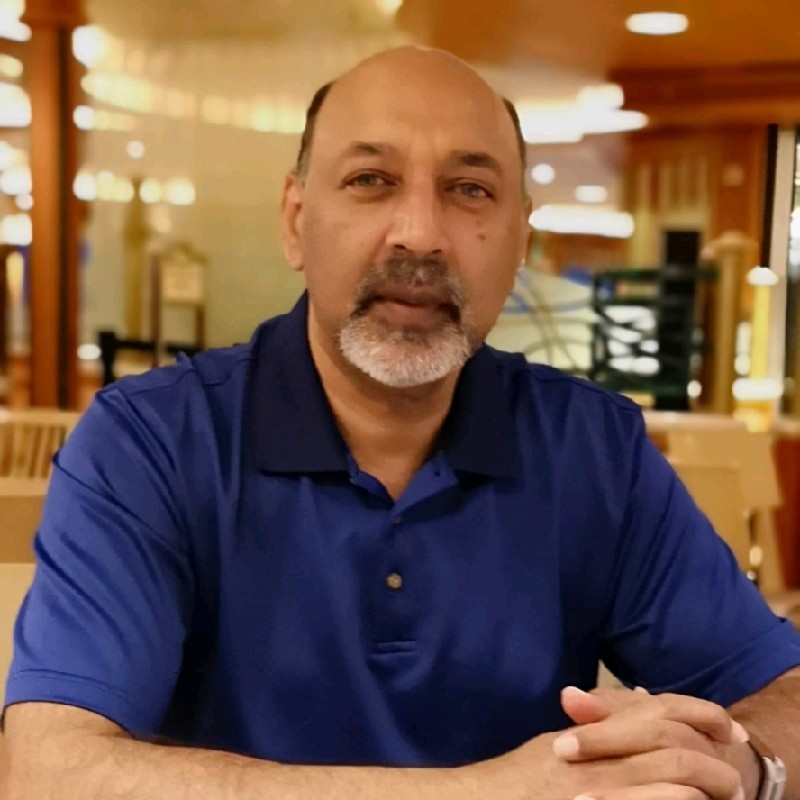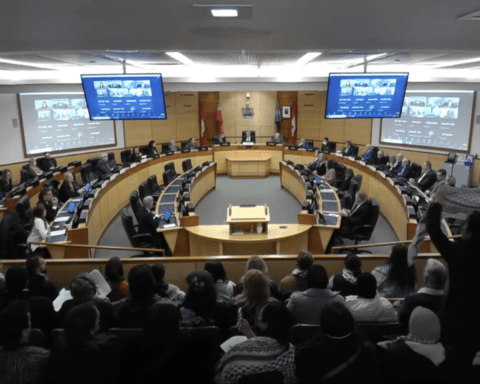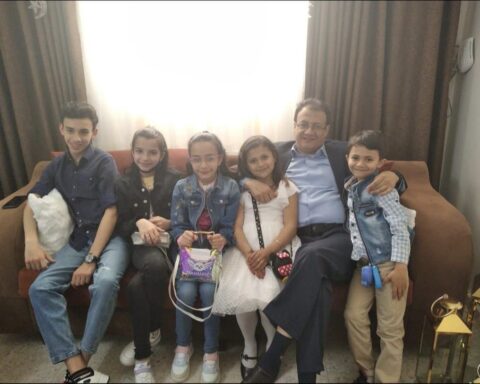A prominent human rights lawyer who was a victim of apartheid in South Africa and came to Canada is all praise for Pretoria’s petition before the International Court of Justice seeking to end the carnage in Gaza.
Prakash Diar, winner of the Law Society of Ontario’s 2023 Human Rights Award, says South Africa presented a strong case.
“[H]ere we have Western countries like the United States, Canada, the U.K., Germany, they post about human rights and international humanitarian law and the rule of law and this is going on a daily basis, the carnage, the massacres are still going on and none of them wanted to do anything about it to try and stop it.”
It’s expected that the ICJ’s 17-judge panel will announce its response to South Africa’s case on Friday, Jan. 26.

Prakash Diar is a human rights lawyer born in apartheid South Africa. Diar worked several high-profile cases defending political prisoners, exposing the perversions of the rule of law that led to years of injustices. One of Diar’s friends and a client were assassinated and Diar was arrested and kept in solitary confinement without charge.
Diar came to Canada in 1989 and says he “literally owes Canada my life,” but he’s critical of his adoptive country’s ambivalence on a genocide petition before the International Court of Justice (ICJ) and proud of South Africa for bringing it forward and seeking to end the carnage in Gaza.
Israel declared war on Hamas on Oct. 7 after the organization and other militant groups launched a surprise attack killing approximately 1,200 people and taking 253 hostage in Gaza. Israel responded with airstrikes and a ground invasion with the stated goals of eliminating Hamas and rescuing the hostages. The Hamas-led Gaza health authority says more than 25,295 Gazans have been killed. The Israeli military says 210 soldiers have been killed.
Critics have accused Israel of committing war crimes like “indiscriminate bombing”, using famine as a weapon of war and targeting journalists. Israel’s lawyers and others reject South Africa’s allegations of genocide, claiming Israel has the right to defend itself against an organization it describes as genocidal.
Diar call’s Canada’s response to South Africa’s petition, “very wishy-washy,” saying his criticisms of Canada are made “out of patriotism.”
Prime Minister Justin Trudeau had said Canada supports the ICJ as an institution, “But our wholehearted support of the ICJ and its processes does not mean that we support the premise of the case brought forward by South Africa.”
At a news conference, Trudeau pointed out that Canada is involved in five cases at the ICJ. Canada’s Foreign Affairs Minister, Melanie Joly, said in a written statement that the legal threshold for proving claims of genocide is high and “requires compelling evidence.”
Federal Conservative Party leader Pierre Poilievre has accused Trudeau and Joly of being deliberately “incomprehensible” and trying to sow divisions between Canadians regarding their positions on the war in Gaza.
The United Nations 1948 Genocide Convention defines the crime as intending to destroy a group in whole or in part, because of their nationality, ethnicity, race or religion. Initially, neither Trudeau nor Joly specifically have said what Canada would do if the ICJ rules in favour of South Africa, although they later clarified that the Trudeau government would abide by the ruling.
Diar notes that Canada’s position has shifted slightly from its initial reaction to the war.
“I think it’s because of a lot of pressure from within Canada for Canada not to take such a blatant one-sided approach in favour of Israel. I think they started seeing what was happening on the ground; massive daily killing,” Diar explained.
Diar believes South Africa’s case against Israel puts Canada in a bind because of the positions it has taken on other genocide cases before the ICJ. In November, Canada, and five European countries filed a joint declaration of intervention in a case accusing Myanmar of genocide against the mostly Muslim Rohingya population. The ICJ case was submitted by Gambia in 2019.
“The countries jointly filed an intervenor application asking the court to apply a broader interpretation of genocide. They’re saying that the court shouldn’t make the threshold of intent so high as to make it near impossible to prove,” Diar said.
Diar and others have accused nations like Canada and the United Kingdom of hypocrisy for their stances on allegations of genocide. Specifically, Diar says Canada’s position hurts our credibility as perceived champions of human rights on the world stage.
“If you’re supporting Israel, [and yet] opposing South Africa’s application, then we’ve got a problem with double standards and hypocrisy because it’s a matter of principle. You can’t say on the one hand, we’re in favour of human rights, international humanitarian law and the rule of law in certain cases but not in others,” Diar said.
“If you are neutral in situations of injustice, you have chosen the side of the oppressor. If an elephant has its foot on the tail of a mouse and you say that you are neutral, the mouse will not appreciate your neutrality.” ~ Archbishop Desmond Tutu #WakeUpEverybody ✊🏿
— Mzilikazi wa Afrika (@IamMzilikazi) January 16, 2024
South Africa’s five-point argument against Israel claims that Israel is engaging in genocidal acts through the mass killing of Palestinians — many of whom are civilians —, the infliction of serious mental and bodily harm, the forced displacement of about two million Gazans, actions deliberately imposed to create conditions that cannot sustain life – like the decimation of the healthcare system – and blockades on food, water, fuel and medical supplies.
As mentioned, Israel’s lawyers argue that the country is acting in self-defence, which is permitted under international law, that South Africa’s accusations that Tel Aviv intends to “destroy” the Palestinian people are based on “random assertions,” that Hamas uses civilians as human shields and that the IDF is trying to minimize civilian casualties, that claims of humanitarian aid blockading are false, and that South Africa doesn’t have jurisdiction to bring its case before the ICJ because it hasn’t shown a prior “dispute” between the two parties.
Legal experts, including Diar, believe South Africa presented a strong case against Israel. However, Diar admits that proving intent in court “is usually the most difficult part to prove” but thinks there’s enough circumstantial evidence or indirect evidence — what he called “smoking guns” — to draw a reasonable inference of intent.
Diar pointed to comments by Israeli officials like Netanyahu’s biblical reference to the Amalek’s holy war and the destruction of its enemies and Israeli Defense Minister Yoav Gallant’s comments comparing Palestinians to “human animals” when announcing “the complete siege of Gaza.”
“These are not ordinary citizens of Israel, these are people in authority. Words in itself is one thing but then that is followed up by action on the ground. So even if they didn’t utter those words, the actions on the ground speak volumes of intent,” Diar claimed.
The ICJ will deliver its order on the South Africa’s request for the indication of provisional measures tomorrow/on Friday but a final decision from the ICJ is likely years away. Even if the ICJ were to rule in South Africa’s favour, the order for Israel to pause its military actions would need to be enforced by the United Nations Security Council or some other force.
In March 2022, the ICJ issued provisional measures instructing Russia to immediately suspend military operations in Ukraine, but Russia didn’t accept the order and the war is still raging. Israeli Prime Minister Benjamin Netanyahu recently stated, “No one will stop us — not The Hague, not the Axis of Evil, no one,” of Israel’s mission to eliminate Hamas.
https://unric.org/en/international-court-of-justice-ukraine-v-russia/Diar says South Africa’s immediate goal isn’t to prove that Israel is committing genocide, but to argue there are plausible characteristics of genocidal acts and ask for an interim order to stop the fighting and allow for immediate relief. If no actions are taken against Israel and the situation doesn’t change, some human rights advocates say that would be a failing of the international justice system exposing flaws with the West’s morality.
Diar says Palestinians have “history and the law and the morality on their side” but Israel is backed by the biggest military in the world in the form of the United States.
“If anything, this is going to tell the world and the majority in the Global South, that they are basically on their own because the rule of law means that every country should abide by the same principles, rules and conventions. Why should Israel be an exception?” Diar asked. “They will be exposed for what they are because then it’s going to be double standards and hypocrisy at its best.”
Recently a group of 50 South African lawyers informed the U.S. and the U.K.’s governments of their intention to open legal proceedings against them for their alleged complicity in Israeli war crimes against Palestinians.
Diar says the international community can band together and decide how to respond to Israel, such as with sanctions or other forms of political pressure. He compared the Palestinians’ situation to South Africa’s struggle for freedom, which started in the ‘60s but took until 1994 to achieve.
“You need really strong, honest brokers to get both the parties and knock their heads together,” Diar said. “But [that will only happen with] the world acting in concert together like they did for us.”
Marcus is a poet, editor and freelance journalist based in Toronto. He currently works with New Canadian Media as an Editor and as a Freelance Writer for ByBlacks.com, The Edge: A Leader's Magazine and The Soapbox Press.




